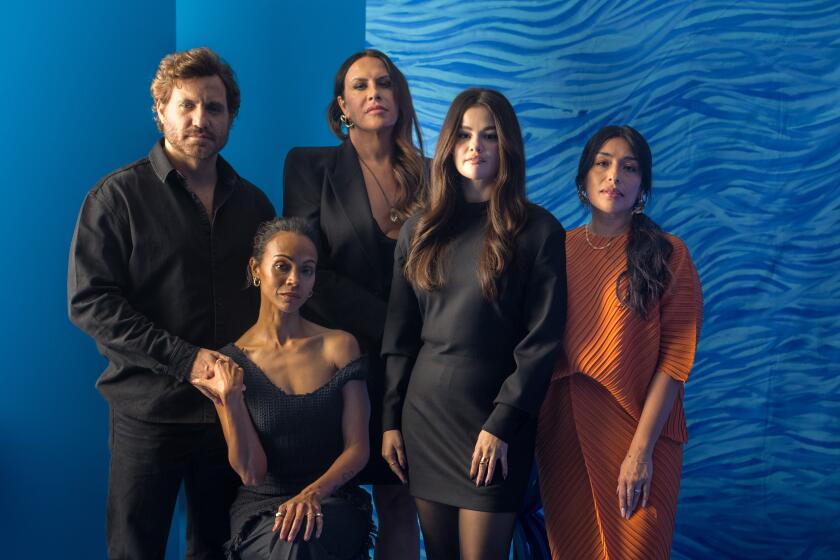In ‘Citizenfour,’ Laura Poitras feels heat of telling Snowden’s story
NEW YORK — The word “risky” is thrown around often in the film world, usually when personalities embark on a new direction or a commercially challenging project.
But Oscar-nominated director Laura Poitras faced a different type of hazard with her latest film, “Citizenfour”: the possibility of arrest, attack and harassment.
The filmmaker, after all, was making a documentary about one of the most-wanted fugitives: secret-spilling National Security Agency contractor Edward Snowden.
“I’d worked in conflict zones, and there’s a kind of fear there,” Poitras, who has made movies in places such as Iraq and Yemen, said in an interview Saturday. “But this is a different kind of fear. The intelligence world operates in the shadows. You don’t know where the dangers lie.”
Poitras was a key person Snowden reached out to when he decided to go public with documents detailing massive U.S. and British surveillance operations. She was one of three journalists who traveled to Hong Kong to hole up in a hotel room over eight days in June 2013 as Snowden revealed much of what he knew as a high-level NSA consultant. She also shot the 12-minute video of Snowden that went viral at the time and in turn made him, at 29, perhaps the most important and polarizing figure of his kind since Pentagon Papers leaker Daniel Ellsberg.
“Citizenfour,” which had its world premiere at the New York Film Festival over the weekend to a standing ovation and will hit theaters Oct. 24, is Poitras’ original video writ large. The movie is a look at how Snowden decided to pull back the curtain on the government surveillance operations and what happened to him when he did, often through never-before-seen footage. The film could reignite the debate over how Snowden should be viewed and shine a light anew on the surveillance apparatus.
Whether Snowden is a whistle-blower or a traitor is a question that has captivated security and foreign-policy thinkers since his leaks reached the public. With “Citizenfour,” Poitras has made a movie that argues for his heroism, emphasizing the risks he took to step forward.
She also lays out in often startling detail the extensive surveillance operations of the U.S. and British governments — including facilities that are believed to process data (possibly emails, phone calls or other information) of millions of citizens — also layering in voices such as those of former NSA official-turned-critic William Binney and activist Jacob Appelbaum. Clips from the strange bedfellows of President Obama and former George W. Bush spokesman Ari Fleischer decrying Snowden are meant primarily to show an establishment’s panic and defensiveness about Snowden’s actions.
Telling at once a story both broad and personal, the film begins with Poitras’ voice-over describing how she had been contacted anonymously by a man identifying himself as “Citizenfour,” who claimed to have proof of illegal government surveillance.
The source turns out to be Snowden, but before Poitras gets to him, she details the extensive national security apparatus that he will soon expose. The director has activists explain how the government uses so-called metadata to track phone calls and movements of ordinary citizens, and she shows clips of James Clapper, director of national intelligence for the NSA, testifying before Congress that the government does not spy on millions of Americans.
The focus then shifts to Snowden, shot by Poitras over eight days in a now-famous Hong Kong hotel room with the Guardian’s Glenn Greenwald and Ewen MacAskill, each ready to break stories based on the classified documents that Snowden is leaking. The revelations are now well known, but they take on a certain power as they begin piling up on screen — the government and telecommunications companies working together to amass information about hundreds of millions of Americans’ whereabouts, phone calls and purchases.
“It’s absolutely staggering and beyond what you can ever imagine,” Poitras said in the interview. “There’s the scope and desire of collecting all of this data, and also the mentality that if they have all communications, they have these repositories they can query later. It’s shocking, really.”
Snowden has made the decision to leak the documents, he says in the film, because he sees a great threat to the future of American free speech. “The elected and the electorate,” Snowden says, have become “the ruler and the ruled.”
The greatest danger is that once this massive database exists, he says, nothing can rebottle the genie. The only thing stopping the massive transfer of personal data then would be a “policy switch” — as Snowden posits, just a shifting of political winds. The chilling effect on a free press that is being watched and potentially harassed can’t be underestimated, he noted.
Asked in the interview how she would respond to those who argue that national security trumps personal privacy, Poitras said: “It’s a faulty argument on many levels. The idea that mass surveillance keeps us safe — there’s just no proof. The [government agencies] are drowning in data and missing things. And I think it’s naive to think that we want the state to know everywhere we go and everyone we talk to and every purchase we make, and that that’s not dangerous.”
There is a kind of unfettered, up-close quality to the Snowden scenes that would be unusual for any documentary subject, let alone a larger-than-life figure. Snowden comes off as cool and composed, looking unnerved on only one or two occasions when the news goes global and the full extent of the U.S.’ interest in tracking him down and prosecuting him begins to dawn on him.
In Poitras’ framing, Snowden projects, occasionally, a sense of no-nonsense confidence — particularly on the technical side of things — but also a kind of selflessness. He is willing, he says, to put himself in jeopardy if it ensures others’ right to privacy and free speech.
Poitras is a well-known foreign affairs investigative journalist, having previously made “The Oath,” about two men close to Osama bin Laden — one of whom ended up in Guantanamo and another who drives a cab in Yemen. She also directed the Iraqi occupation documentary “My Country, My Country,” which scored her an Oscar nomination.
Those films, Snowden said in his initial emails to her, made her a no-brainer. “You asked why I chose you. I didn’t. You chose yourself,” he writes to her in a scene early in the film, alluding to how her positions skeptical of U.S. government authority made her a natural fit for him.
That choice proves a fraught one. With the U.S. government hunting Snowden and seeking his extradition even as Poitras is shooting, the film could easily have not seen the light of day.
“It’s easy to look at it in retrospect and say these stories and documents were going to get out, but there was a lot of fear and danger,” she said. It might not be lost on some viewers that Poitras has long been on the U.S. watch list and moved to Berlin in part, she says, because she was tired of long interrogations by border officials and confiscations of her laptop and reporting materials when she arrived at U.S. airports.
The film distributor Radius acquired “Citizenfour” — which was produced by the socially conscious Hollywood outfit Participant Media — this spring and has hopes that the documentary’s high-profile personality and issues can fuel theatrical sales. HBO boarded the project more recently and aims for a television airing in the spring.
Though “Citizenfour” is the third in what Poitras describes as a post-9/11 trilogy, that hardly means she is done with the story. The movie offers some closure with the shot — at a distance, through a window — of Snowden and his girlfriend, Lindsay Mills, previously thought still in the U.S., making dinner in Moscow. But it also hints at new revelations. The documentary shows a scene in which Greenwald, meeting with Snowden in Moscow after the noise has quieted down, suggests that the U.S. government’s “watch list” now numbers up to 1.2 million people. Snowden looks stunned.
Poitras said in the interview that she hoped to continue following the story and in fact may release the dozens of hours of footage from the Hong Kong hotel. “It’s part of the public record. They need to get out,” she said.
Added Snowden’s father, Lonnie, at the premiere: “The truth is coming, and it cannot be stopped.”
More to Read
Only good movies
Get the Indie Focus newsletter, Mark Olsen's weekly guide to the world of cinema.
You may occasionally receive promotional content from the Los Angeles Times.











